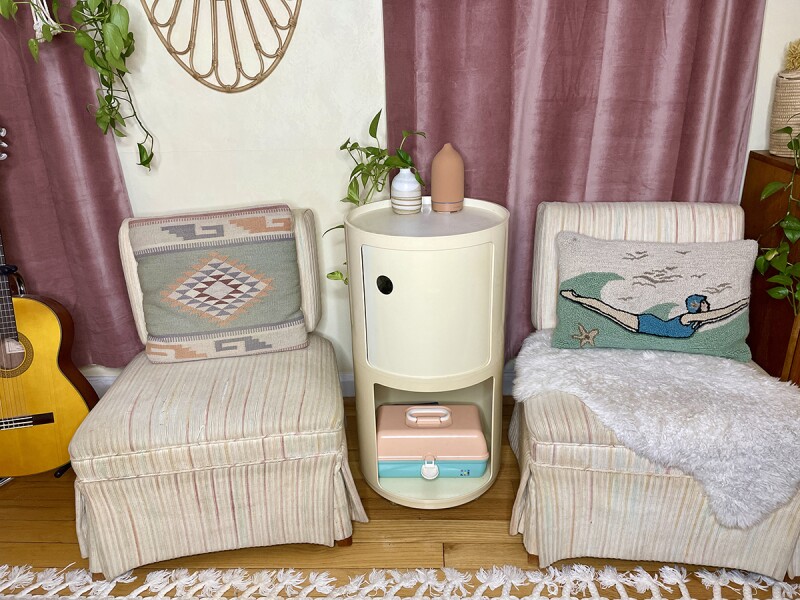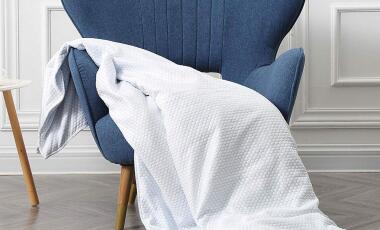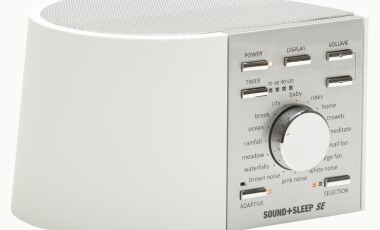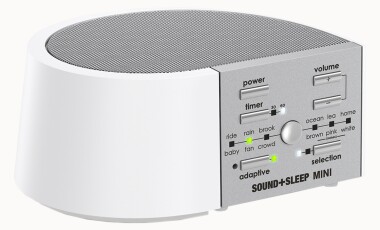The environment around us deeply impacts our mood and mindset, especially when it comes to our ability to get a good night’s sleep. As a designer and home decor expert who also has insomnia, my profession gets personal when it comes creating a relaxing bedroom environment.
According to Johns Hopkins sleep medicine specialist Dr. Rachel Salas, “Simple changes can have powerful impact on your sleep quality.” And I couldn’t agree more. Designing a stress-free space where you can unplug and unwind — even in small ways — is an effective step we can take toward improving our sleep hygiene and getting our minds in the mood for bed.
Here are some easy ideas you can use to create a relaxing bedroom environment that’s serene and supportive of a good night’s sleep.
Create a soothing color palette

Whether you’re starting with a blank slate or embarking on a bedroom makeover, color is a great place to start. The color of a room can instantly trigger a psychological response, influencing one’s mood and comfort levels. If you doubt the powerful effect of the color palette, consider the amount of time and effort companies devote to understanding how brand colors influence consumer habits.
Pink is said to be a relaxing, disarming hue, making it a great choice for a soothing space. Earth tones create a calming effect on the mind and can make people feel more rooted to the ground. But in addition to their soothing effect, earth tones provide a more neutral palette that you can easily add to and remove from as your lifestyle and design taste evolves through the years.
Clear the clutter

There is nothing that distracts and aggravates my mind faster than clutter everywhere. But I am no minimalist and I’m certainly not the cleanest person in the world, which makes this a challenge. So how can we keep a really clean bedroom without a lot of effort? Baskets. Lots and lots of baskets.
Baskets are my favorite solution for this category. Corralling clutter into attractive baskets is a great way to soothe the mind while bringing in all-natural fibers that fit the tranquil bedroom design we’re going for. A collection of them with designated, multi-functional uses is both practical and lovely to look at.
You can find baskets at any store, but I love to score a unique, handmade find at a flea market, or by scouting Etsy. However, you might be able to shop your own house right now and find a basket or two that can be used to clear the clutter in your bedroom and calm the chaos in your home for a better night’s sleep.
Minimize mess with functional furniture

After tackling the clutter, it’s helpful to figure out ways you can minimize the amount of mess you make to begin with. Prevent build-up of the various odds and ends that can accumulate on dressers and bedside tables by installing a shelf to display chosen pieces. I found a beautiful organic rattan oval shelf. It has natural fibers, smooth curved lines, and a cool design that I can see serving this space for years. But most importantly, it keeps my surfaces clear. The less stuff you have to clean, the more time and energy you have to relax.
Set the vibe with lighting

Whenever anyone asks me where to begin with transforming a space, I often suggest making a shift in the lighting, because the lighting scheme of a room is hugely impactful to the look, feel, and function of it. In an ideal design world, your lighting should be as soothing as your color palette.
Bedroom design should shy away from harsh overhead lights and bright bulbs. Instead, layer your light sources with both table and wall lamps to create an adjustable scheme that can work for reading, connecting, and unwinding. For instance, in our bedroom we have matching lamps on our bedside tables, a soothing muted wall sconce, a small lamp on another table, and window lights that glow at night.
You’ll also want to make sure that your lamps and light sources are at a height that minimizes glare. Using low-wattage lightbulbs creates an ambiance without electrifying your tranquil sleep space, so be mindful when setting the scheme to choose the correct wattage and size.
Promote relaxation with blackout curtains

Good light is ideal for promoting relaxation while you’re awake, but once you go to bed, any light at all can be agonizing. So those who are looking to cut out light altogether — which can include shift workers, frequent travelers, those with irregular sleep-wake rhythms, and light sleepers — may want to consider putting blackout curtains on the windows. Unlike light-filtering curtains, black-outs seal in darkness while keeping all manner of light pollution out, and can go a long way in helping remove relaxation-destroying sleep disruptors.
Help set your internal thermostat
As important as good design is to your bedroom, it won’t go far if you’re not comfortable in your sleep space. Whether you sleep hot or cold, plan to decorate your bed in textiles that help you sleep your best — whether with layers of warming texture or cool, breathable fabrics like linen.
The right blankets can also help to reduce insomnia. There can be many roadblocks to restful slumber but some people have more than others. Things like a high-stress job, an over-packed day, generalized anxiety, depression, ADHD, menopause, chronic pain, hormone imbalances — you name it — can all invite insomnia along for the ride. Living with one or more of these things means we might need to put more thought and intention into creating a space that calms and soothes.
One thing that professionals have used to treat anxiety disorders and provide support to people on the Autism spectrum, is weighted blankets. You’ve likely seen people talk about how great they are for self-care, and research has proven this to be true. When dealing with chronic pain, a randomized control trial proved that “widespread pressure delivered by a weighted blanked reduces chronic pain”. From my personal experience, I use a King-sized 35-pound weighted BlanQuil that keeps my husband’s restless legs from waking me. Additionally, both my anxiety and chronic pain are soothed by the gentle pressure that feels like a big hug from a comforter.
Minimize stress with essential oils and aromatherapy

Essential oils smell lovely, but did you know they are made from actual plants that have structural properties that benefit people? The act of smelling essential oils to improve health is called aromatherapy, because the scents stimulate the central nervous system and trigger an emotional response. So when we take a sniff of lavender oil, for example, and feel chill afterwards, it not just because we like the smell, it’s because lavender is known for having a calming, soothing effect on the human central nervous system. If this feels too hippy or witchy to you, take a whiff of peppermint oil the next time you feel nauseous and see how quickly the negative feeling dissipates. Other benefits include mood boosting, stress reduction, improved sleep, and decreased anxiety.
With these powerful effects from aromatherapy, it can be a good idea to bring an aromatherapy diffuser or a linen spray infused with your favorite essential oil into the bedroom. When it comes to diffusers, there is an array of designs and styles to choose from, and it’ll serve your new bedroom to choose one that matches your soothing color scheme. In addition to adding soothing scents to your bedding, the linen spray can help smooth out wrinkled sheets. Oh, and you can make it yourself too.
Create spaces that increase connection

Optimizing your home to foster greater presence – like creating a place where you can sit and talk with your partner or kids – can be a subtle reminder to take a moment to reconnect. Doing so can be deeply rewarding, especially for adults when the kids are in bed.
We like to put on our favorite relaxing playlist, get the aromatherapy going in the diffuser, and put our devices away in the designated basket so we can be present together. It’s an easy and attainable date night that you can have right at home.
Unplug (literally)
It’s no secret that blue light from our devices can disturb our circadian rhythms and, therefore, our sleep. But how can we make sure we’ll actually follow through with powering down the recommended hour or two before bed?
Having a partner who is willing to join you and even keep you accountable is a helpful first step. On your own or together, designate a basket where you will both put your phones at around the same time each night.
This ritual will help you both get into a schedule that promotes unwinding at the same time each night, removes blue light from your bedroom, lessens interruptions and stress, and opens the door for connection and relaxation. It also sets a great example for your kids, if you have them.
Plants

Whether placed in pretty pots or hanging from sand-colored ropes on ceiling hooks, plants can be a great addition to a relaxing, sleep-optimized bedroom. They’re calming, beautiful, and, depending on what kind you choose, low-maintenance in terms of upkeep and care. The lowest maintenance plants would be faux plants, which can deliver the ultimate no-fuss greenery that can still bring the nature vibe into the bedroom. Those who really need to soothe their senses may want to explore horticulture therapy, which can improve your mental well-being.
Noise control
Sensitive to sounds? Don’t let a noisy neighbor or the nagging hum of an appliance pull you out of your slumber or worse — keep you from getting any in the first place. You may not be able to install soundproof windows (which do exist, by the way), but you can bring in devices like a white noise machine, or even heavy curtains that can help muffle sounds.
There’s also a way that savvy home design can be used to help target certain areas that are problematic. For example, if noise is coming in from a specific wall, consider muffling it with a book case that can absorb the vibrations. You can also a position a rug over creaky floorboards to help dampen noise, or get a soundproof foam sheet to put in your windows at night.
Relaxing bedroom design is about what feels best to you

Whether you are reading this on your computer, during a hectic commute to work, or guiltily in bed while trying to find ways to fall asleep, know that you aren’t alone. So many of us are over-worked and over-tired, and need to find a way to rest and recharge. As this guide shows us, we can accomplish this without having to spend a lot of time, money, or energy by re-purposing things we already have at home and making a few simple yet impactful changes. I hope you are feeling a little spark of inspiration to create a tranquil in-home escape where you can unplug, connect, and really restore yourself.















